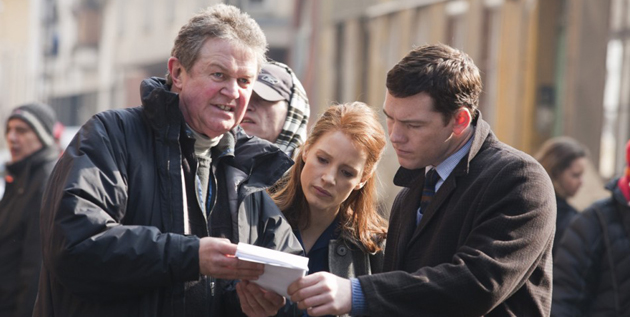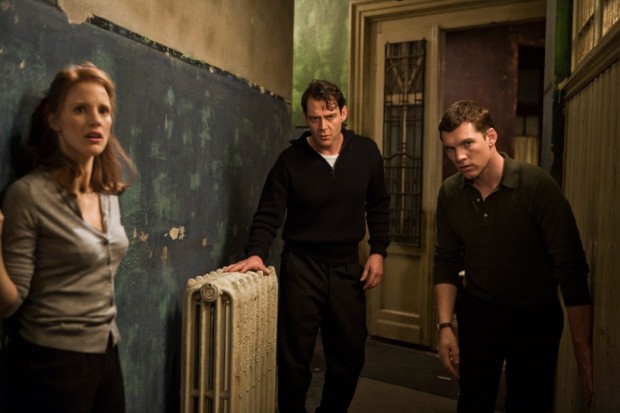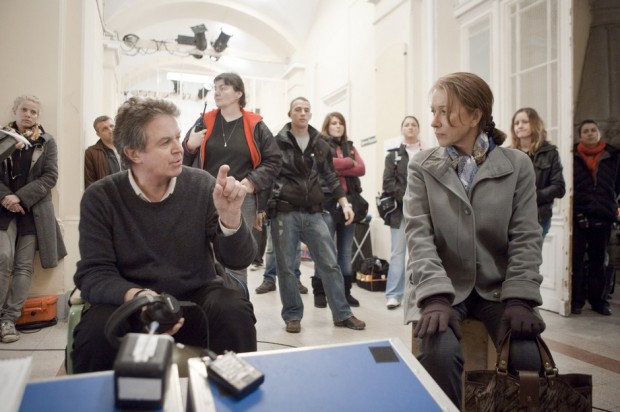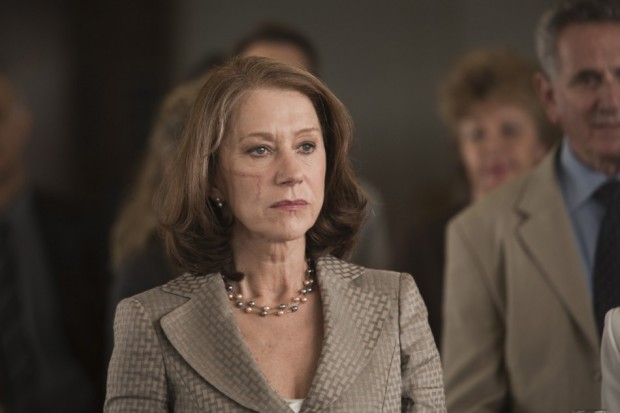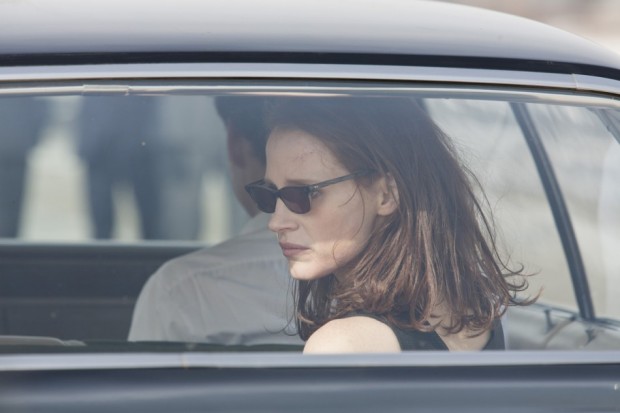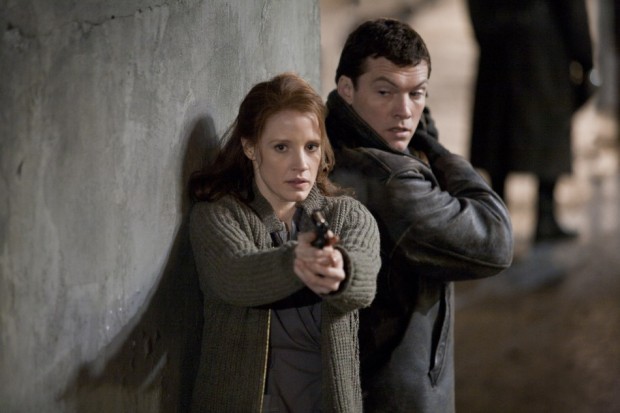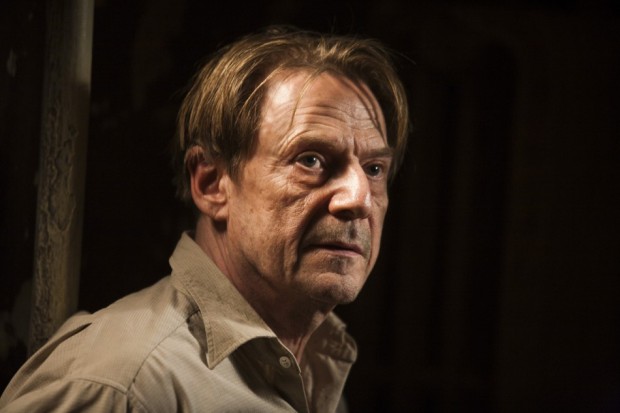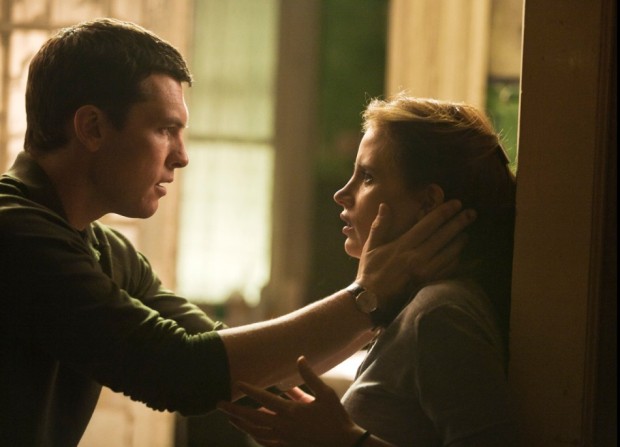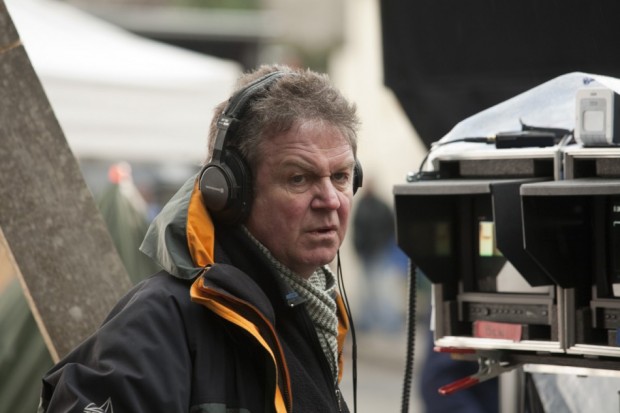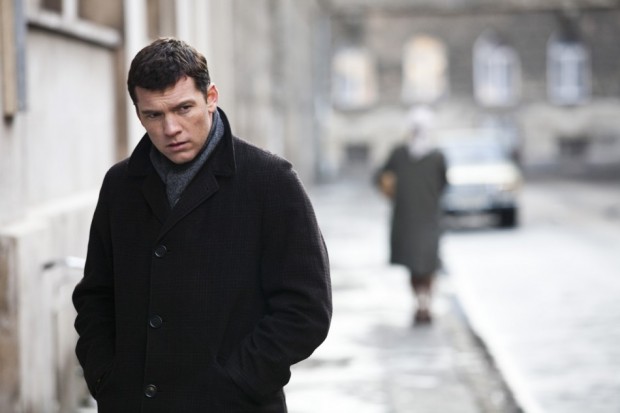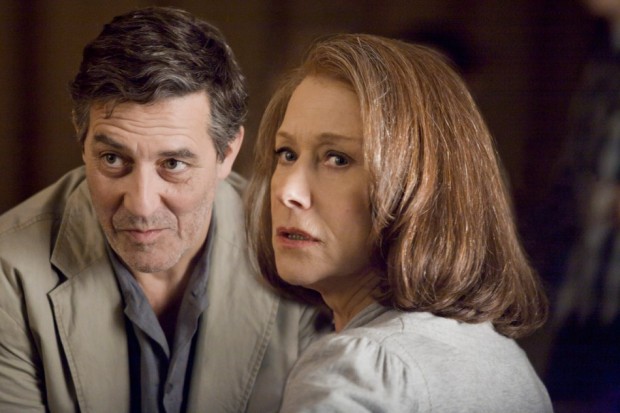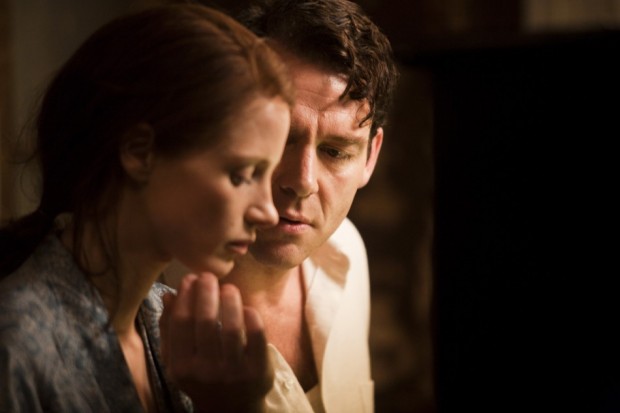The Debt is a thriller with a superb cast that keeps you on the edge of your seat. More than that, though, it’s a film that will open up discussion of the themes it explores and give you something to think about long after the credits roll. Last Monday I had the great pleasure of chatting with John Madden, the director of The Debt. Among the topics explored were how the film came to him, his casting of Jessica Chastain as an unknown to portray a younger Helen Mirren, how the actors did all of their own stunts in the safe house, and the frustration of delays. We also talked about his role as the director of the Star Wars radio plays a long time ago, the status of his adaptation of the Bartimaeus Trilogy, and how we both have famous people with our same names. I have included the audio file, transcribed the entire interview, and time stamped it for your convenience. Check it out below.
00:01: I ask if he is aware of the other John Madden out there. He tells two great stories about that situation.
01:41: Brought up his stage background and ask if he does a lot of rehearsals.
03:35: I mention to Madden how the film reportedly fell into his lap because Matthew Vaughn and Jane Goldman took on Kick-Ass instead.
4:34: Asked Madden how he knew Goldman and Vaughn.
5:12: His thoughts on Jessica Chastain blowing up this summer and how he originally cast her as an unknown to play the younger Helen Mirren.
8:03: I mention Chastain was described as a chameleon because she blends into her roles. Madden speaks on that point.
9:06: Questioned Madden about the frustration of the film being heavily delayed from release and whether he knew it was a good film at that point.
10:59: I talk to Madden about a key scene being twisted as the film goes along and whether that was drawn from the film or in the script.
11:40: Asked Madden about the Krav Maga training and how intense it was for the actors.
13:43: I bring up Madden’s role as director of the radio adaptations of A New Hope and The Empire Strikes Back. He reveals he also directed Return of the Jedi and goes into detail about how he got involved and the fun he had.
16:22: Queried Madden about the status of the Bartimaeus Trilogy adaptation, a young adult fantasy series he was developing.
Stream the audio file below or download here (right-click and save as).
The Film Stage: One of the first things that I wanted to talk about, to just kind of start off light… it’s funny; I don’t know if you’re aware that there’s another big icon with your same name.
John Madden: I am aware. I think in the early days of IMDB our filmography somehow merged. [Both laugh] Before anyone knew what IMDB was, I suddenly seemed to have a list of credits I didn’t remember having much to do with. So yes. Every time I arrive at an airport, the limo driver obviously thinks they’ve got a big story because famously he doesn’t fly. So I always see their face drop when I come around the corner.
[Laughs] Like, no, no, this is me. [Both laugh] It’s funny because I think, for me, personally, there’s a number of Bill Graham’s out there. There’s Billy Graham, and then there’s the famous rock producer.
Madden: Indeed.
I think you kind of stepped out of the shadow by winning an Oscar. I think that definitely helped.
Madden: [Laughs]
But let’s go ahead and kind of jump into The Debt. First off, I definitely want to say that I really, really enjoyed this film.
Madden: Good.
I was surprised by how much I enjoyed it. I didn’t know what to expect. Obviously it’s got a stellar cast, but I’m curious. I looked…
Madden: It’s a surprising film, I think, in many ways.
Definitely. I’m looking at your background, and I noticed you have a lot of stage experience.
Madden: Yes.
Is it safe to assume you do a lot of rehearsals?
Madden: Uh, it depends on the project, to be honest with you. Of course, I’m completely comfortable with that process, the rehearsal process. Sometimes on film, I think that all one needs to do is simply prime the actors, as it were, in the sense of an explosive. To the point where they’re allowed to detonate when they’re in front of the camera. But, in this particular instance, I did rehearse because I felt that I shot the movie in a particular order, which I decided early on I would do. To shoot all the material in the safe house first.
And I wanted to bring the actors into a sort of relationship with one another where they had a complete trust of what one another… all four actors, I’m talking about. And there just are physical circumstances that we had to get through the Krav Maga sequences, and so forth. Just needed choreography, and practice, and just repetition as the French word for rehearsal, as you know. So that aspect of it just meant that I wanted to have those people completely comfortable around one another. Once we put them into that circumstance, I could move swiftly through it. I choreographed everything in the rehearsal period. We rehearsed on the set, so we knew exactly what we were doing. But I don’t always do that. It depends entirely on the piece.
Interesting. You mentioned in an interview that this film kind of fell into your lap because famously, Matthew Vaughn and Jane Goldman took on Kick-Ass.
Madden: Well, actually, in truth, they had written an adaptation of the original Israeli film, somewhat at the same time. Almost simultaneously with writing Kick-Ass. And Kick-Ass came together as a project at pretty much exactly the time that The Debt did. Because I think Matthew originally had pondered whether he would direct it himself. So they sent the script to me at that point. But I didn’t have access to Matthew and Jane as I started to work on the film because they were already deep into the other film, or were about to be. So I started to work on the script with Peter Straughan, who’s the other credited screenwriter.
And how do you know those two?
Madden: Matthew and Jane?
Yes.
Madden: I didn’t actually know them. Well, Matthew and I have probably met before, but I guess Matthew just knew my work and knew, I think, where I might be likely to come from with the material. He and Kris Thykier, actually. I don’t want to single Matthew out; they were both producers on the film. And, in fact, Kris became my producer because Matthew was not around to be hands on, most of the time, because he was making his own film.
Absolutely. You mentioned in another interview that you kind of cast Jessica Chastain after landing Helen Mirren. You wanted an unknown of sorts.
Madden: Yes.
Right now, I’ve kind of dubbed this as the Summer of Chastain. She’s got like three films out…
Madden: And another three coming.
Yeah. What has it been like to sit on the sidelines and see her blow up?
Madden: Well, it’s been a sort of strange irony. But actually it’s one that paradoxically, I think, the film has benefited from hugely. I mean, look, she’s a phenomenal talent, is the truth of the matter. I’ve considered myself really, really lucky to have found her. I only wanted to cast an unknown in that role because I didn’t want the agenda of the film to become sort of high jacked by how well-known actress A turned into well-known actress B. Because that’s not a sort of useful or particularly interesting agenda for the film. And I felt that I was after a sort of symbiosis there. In an ideal world, a physical affinity between them, which I found. But what I didn’t expect to find was an actress of such skill and brilliance, who actually shares a quality with Helen, which is this…I always used to say about Helen when I worked with her the first time, you can see the weather change on her face. There’s something so expressive that the camera can sort of read what’s going on in her mind.
There’s a transparency to her as an actress. And Jessica has exactly the same quality. They’re both fierce trained, of course. As it then turned out, because of the rather complex studio realignment that took place where we found ourselves orphaned when Disney closed Miramax as a studio. Disney then adopted us, for awhile, and we thought we were going to be released by Disney last year. But then when Disney concluded the sale of the Miramax label and back catalog, we were included in that sale. So suddenly we were orphaned a second time and immediately snapped up by Universal, I’m thrilled to say. So now with the movie coming out, as you know, a year and a half or so later than it might have and Jessica, now, as you say, is an actress with a distinct profile. But not an actress with any baggage, for an audience, I think, because she’s an extraordinary performer in the sense that she disappears into the role that she plays. Even what’s come out thus far, Tree of Life, The Help, and The Debt, it’s quite an extraordinary curve that you have to draw to join those up.
Absolutely. Someone was describing her the other day and they were saying that she’s a chameleon.
Madden: Yes.
She really kind of blends into the roles.
Madden: Well, she considers it her job as an actor to borrow into the role. To find what’s going on in the role rather than to make the role into herself. And that’s because she’s a trained actress, and theater actress. And that’s about transformation. Theater’s about transformation. And so I think that she falls into an unusual category where I think she has an extraordinary range. She can play comedy, she can play a tragic character, she can play period, she can play modern, she can play British, she can play American. She’s really got the skills to make herself into a number of different things, and I think she’s got an amazing future because of that.
Yeah, definitely. You touched briefly on there was a release delay. How frustrating was that for you? I mean, did you know this was a good film when you had it in the bag or…?
Madden: Yeah, I knew the film was strong. I absolutely knew the film was strong. It is frustrating. I mean, I think the major frustration was that we were embarked upon a release process when we played Toronto last year. Luckily, I was making another movie at the time, so I didn’t have time to fret about it, really. And I have to say, Universal moved to acquire the film so smartly… so quickly when it became available, because the company that bought Miramax had no distribution set up. So the moment that happened I felt very happy because I can’t, frankly, think of a better distributor for it than Universal’s Focus at this point. They’re absolutely on top of the kind of challenges… marketing, and making people aware of this kind of film. So, yeah, it is frustrating because when you got a momentum with the film, you want it to get out there. But the chips fall where they do, and I’m not remotely unhappy now that the film is going out when it is. I think it’s a great slot for it. I think there’s a real opening for an intelligent… that’s pretty off of me to say, but you know, I think a thriller that demands a little bit from its audience and that gives you something to think about. I think that’s a very good spot for it right now. So I’m perfectly happy now.
The film plays out an image towards the beginning, and I don’t want to give too much away, so I’ll be vague.
Madden: Yeah.
It plays out an image towards the beginning but that slowly changes. Your understanding of that.
Madden: Yes.
Was that part in the script or was that in the original film?
Madden: It was not in the original film, from where that happened, no. No. That was something that we developed. So that structural leap was a very, very good one. It didn’t happen that way in the original film. Sorry, the narrative is the same, but not the way it’s told. The structures of the films change quite a bit, actually.
Interesting. You mentioned the Krav Maga… wanting to get through a lot of that portion in the very beginning. How intense was the training for the actors and how much were you saying… I think Jessica [Chastain] said that she trained for four months?
Madden: Yeah, she did a lot of training because she’s not an animal that is used to combat…
[Laughs]
Madden: Basically she would be the first to say. She has never raised her arm to anybody in her life, so quite characteristically; she wanted to get inside that process so she could actually get some insight into a habit of thought about that. How a character would think about taking care of themselves physically. And Krav Maga is pursued quite widely as a sort of workout or a physical discipline in the same way that other martial arts are. So she did quite a bit of training on her own before she came to us. We then had some experts with us who trained them individually and also specifically choreographed with me what was going on. Because we had one scene, in particular, obviously was written around that training. So that was part of the process, as indeed were the choreography of the fights because that’s something I absolutely had to know about and decide before we arrived at a conclusive design of the set. And also to know that we could shoot that stuff safely because all of those sequences in the film are shot with the actors. There are no stunt doubles in this film at all.
Some kind of miscellaneous questions here. I’m looking through your profile on IMDB, and I actually ran across the fact that you directed radio adaptations of A New Hope and The Empire Strikes Back.
Madden: Well, no, actually, all three of them.
All three of them? So Return of the Jedi? Wow.
Madden: Yeah. It was Star Wars, The Empire Strikes Back, and the Return of the Jedi.
Interesting. What was that experience like and is that the closest you’ll get to directing sci-fi or fantasy?
Madden: I dunno. I dunno. If an interesting sci-fi movie came across… I did read one, actually, a while ago, which I thought was absolutely fantastic which hasn’t been made. It was just too expensive. But it was great. I was working in radio drama in the U.S. when… There was an interesting providence to that project because the public radio network, as I’m sure you know in this country, is connected to and exists alongside the state university network. So public radio stations are usually university based.
And George Lucas gave the radio rights, which I think he’d been a radio drama fan in his youth, to KUSC, which is his alma mater. University of Southern California in LA. And they earned the radio rights and somehow that was brought… we became aware of that, I guess, and I was the only practitioner of radio drama around at that point. So I got the gig, basically. We did the first one, and then about a year later we did the second one, and about four or five years later we did Return of the Jedi. It was pretty terrific. We had very, very sophisticated tools at our disposal because we made it on multi-track, which is very unusual in those days for radio drama. And we had access to Ben Burtt’s, the sound designer of the original movies, entire library.
Wow.
Madden: And we used the original John Williams’ score as well. So it was cool, actually, to direct something, which was unusual for radio drama, where you’re keying images that the audience has in their heads. Because normally you’re painting the picture from scratch for them. But it’s very interesting.
Interesting. On that note, I noticed that something you were developing or you were attached to at some point, called the Bartimaeus Trilogy.
Madden: Yes.
Is that completely dead or…
Madden: I don’t know what’s going on with that, to be honest with you. And I’m not even sure who owns the rights. It was fantastic books. It’s sort of like Harry Potter with attitude. I don’t know if you know the…
I am familiar with them.
Madden: Yeah, well, the material is terrific, I think. When we were developing it then, it was a Miramax, i.e., pre-Weinstein Company thing, and they had the rights, but I don’t know if they still have the rights, to be honest with you. As with all of those things, there’s a financial equation that has to do with how strong the brand is relative to how much money is being risked, and therefore how much of an existing audience there will be before you start. And I think that’s what it’s about. I think creatively, everyone always thought the material was wonderful.
Interesting.
Madden: It was nice to talk to you.
Oh, absolutely. I appreciate you taking your time out of your day and I can assume you’re very busy.
Madden: OK, well I’m really glad you enjoyed the movie. That’s terrific. The more we can bring it to people’s attention, the better.
Focus Features, a subsidiary of Universal, is distributing the The Debt in a wide release this Wednesday, August 31st. The film stars Helen Mirren, Ciarán Hinds, Tom Wilkinson, Jessica Chastain, Sam Worthington, Marton Csokas, and Jesper Christensen.

